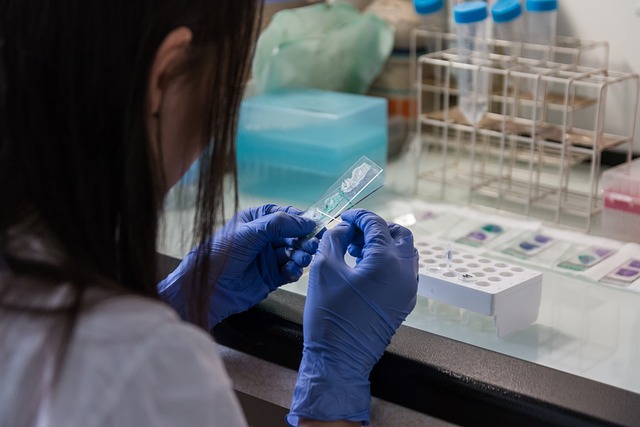In the UK, hormone analysis via the standard liver blood test is a vital tool for diagnosing reproductive issues. It measures key hormones like estrogen, progesterone, and testosterone to identify imbalances linked to infertility, irregular periods, or gynecological problems. These insights guide personalized treatment plans targeting conditions such as thyroid disorders or polycystic ovary syndrome (PCOS). By utilizing this analysis, UK individuals receive effective, tailored treatments for their unique reproductive health needs.
“Uncovering reproductive health mysteries: Hormone analysis is a powerful tool for identifying and addressing hormonal imbalances. In the UK, understanding standard liver blood tests plays a pivotal role in diagnosing these issues. This comprehensive guide explores how these tests, often part of a hormone analysis, provide insights into your reproductive well-being.
From interpreting results to navigating the next steps, we’ll demystify the process. Learn how a Standard Liver Blood Test UK can be an essential diagnostic step, offering valuable information for tailored treatments and improved fertility.”
- Understanding Hormone Analysis for Reproductive Health in the UK
- The Role of Standard Liver Blood Tests in Diagnosing Hormonal Imbalances
- Interpreting Results and Next Steps After a Hormone Analysis Test
Understanding Hormone Analysis for Reproductive Health in the UK
Hormone analysis plays a crucial role in diagnosing and managing reproductive issues in the UK. This advanced diagnostic tool involves assessing hormone levels in the blood, offering valuable insights into the body’s intricate reproductive system. Unlike a standard liver blood test UK, which primarily focuses on liver function, hormone analysis targets specific hormones related to reproduction, such as estrogen, progesterone, and testosterone. By examining these levels, healthcare professionals can identify imbalances that may contribute to infertility, irregular periods, or other gynecological problems.
In the UK, hormone analysis is often recommended when conventional fertility treatments don’t yield results. It helps in personalizing treatment plans by identifying the root cause of reproductive challenges. For instance, low estrogen levels might indicate an underactive thyroid or early menopause, while elevated testosterone could signal polycystic ovary syndrome (PCOS). This tailored approach enhances the effectiveness of treatment and improves outcomes for individuals seeking to conceive or manage existing reproductive health conditions.
The Role of Standard Liver Blood Tests in Diagnosing Hormonal Imbalances
In the quest to unravel reproductive mysteries, healthcare professionals often turn to the insights provided by standard liver blood tests in the UK. These routine assessments play a pivotal role in diagnosing hormonal imbalances, offering a window into an individual’s overall health and metabolic function. By measuring various enzymes, proteins, and other markers, these tests can highlight discrepancies that may indicate underlying hormonal disorders.
For instance, elevated levels of certain enzymes like alanine aminotransferase (ALT) or aspartate aminotransferase (AST) could suggest liver inflammation or damage, potentially linked to hormone-related issues. Additionally, abnormal levels of cholesterol and triglycerides can provide clues about endocrine imbalances affecting lipid metabolism. The standard liver blood test in the UK is, therefore, a valuable tool that aids in the early detection and management of reproductive hormonal disorders.
Interpreting Results and Next Steps After a Hormone Analysis Test
After undergoing a hormone analysis test, interpreting the results is a crucial step in understanding your reproductive health. This process involves comparing your hormone levels with established normal ranges, which can vary slightly depending on age and gender. A standard liver blood test UK typically includes measurements of key hormones like estradiol (a female sex hormone), testosterone (a male sex hormone), and progesterone, among others. If your results show abnormal levels, it could indicate underlying reproductive issues such as polycystic ovary syndrome (PCOS), thyroid disorders, or other endocrine imbalances.
Once you have your results, the next steps depend on the specific findings. Your healthcare provider may recommend further tests to confirm any diagnoses or suggest lifestyle changes, such as diet and exercise adjustments, to help regulate hormone levels. In some cases, medical interventions like medication or hormonal therapy might be prescribed. Regular follow-up testing can also be beneficial to monitor progress and adjust treatment plans accordingly.
Hormone analysis plays a pivotal role in diagnosing reproductive issues, with standard liver blood tests serving as a crucial tool in the UK. By understanding the interpretation of test results, individuals and healthcare professionals can take informed next steps towards effective management and treatment. This comprehensive approach ensures that hormonal imbalances are accurately addressed, fostering better reproductive health outcomes.
